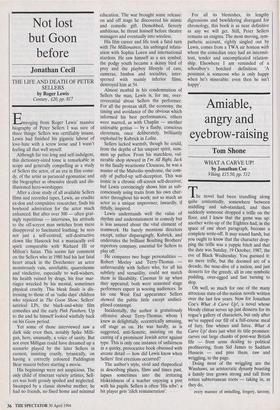Not lost but Goon before
Jonathan Cecil
THE LIFE AND DEATH OF PETER SELLERS by Roger Lewis Century, £20, pp. 817 Emerging from Roger Lewis' massive biography of Peter Sellers I was sure of three things: Sellers was certifiably insane, Lewis had finished his gigantic labour of love-hate with a screw loose and I wasn't feeling all that well myself.
Although far too long and self-indulgent, this dictionary-sized tome is remarkable in scope and generally compelling as a study of Sellers the actor, of an era in film come- dy, of the artist as paranoid egomaniac and the biographer as obsessive sleuth and dis- illusioned hero-worshipper.
After a close study of all available Sellers films and recorded tapes, Lewis, an erudite ex-don and compulsive researcher, finds his boyhood admiration for the actor much enhanced. But after over 300 — often grat- ingly repetitious — interviews, his attitude to the off-screen man switches from mere disapproval to fascinated loathing; he sees not just a self-centred, self-destructive clown like Hancock but a maniacally evil spirit comparable with Richard III or Milton's Satan. This seems fair comment on the Sellers who in 1980 had his last fatal heart attack in the Dorchester: an actor monstrously vain, unreliable, quarrelsome and vindictive, especially to well-wishers, his health ruined by drugs, his four mar- riages wrecked by his mental, sometimes physical cruelty. This bleak finale is dis- tressing to those of us 'radio days' children who rejoiced in The Goon Show, Sellers' satirical LPs, the black-and-white film comedies and the early Pink Panthers. Up to the end he himself looked wistfully back on his Goon period.
Yet some of those interviewed saw a dark side even then, notably Spike Milli- gan, here, unusually, a voice of sanity. But not even Milligan could have dreamed up a scenario played by the later Sellers in earnest, insisting crazily, tyranically, on having a correctly coloured Paddington Bear mascot before starting a movie.
His beginnings were not auspicious. The only child of itinerant variety artistes, Sell- ers was both grossly spoiled and neglected. Swamped by a classic showbiz mother, he had no friends, no fixed home and minimal education. The war brought some release: on and off stage he discovered his mimic and comedic gift. Demobbed, fiercely ambitious, he thrust himself before theatre managers and eventually into wireless.
His film career and life took a fatal turn with The Millionairess, his unhinged infatu- ation with Sophia Loren and international stardom. He saw himself as a sex symbol; the podgy youth became a skinny bird of prey and the playboy lifestyle of cars, cameras, bimbos and socialites, inter- spersed with mainly inferior films, destroyed him at 54.
Almost morbid in his condemnation of Sellers the man, Lewis is, for me, over- reverential about Sellers the performer. For all the protean skill, the economy, the timing and avoidance of the obvious which informed his best performances, others were marred, as with Chaplin — another unlovable genius — by a flashy, conscious cleverness, once deliberately, brilliantly exploited by Kubrick in Lolita.
Sellers lacked warmth, though he could, from the depths of his unquiet spirit, sum- mon up pathos. From his matchless, vul- nerable shop steward in I'm All Right, Jack to the finally wearisome Clouseau, he was a master of the Malvolio syndrome, the com- edy of puffed-up self-deception. This was ironic in a chronic off-screen self-deceiver, but Lewis convincingly shows him as sub- consciously using traits from his own char- acter throughout his work; not so much an actor as a unique improviser, inwardly, if fitfully, inspired.
Lewis understands well the value of rhythm and understatement in comedy but is less assured about the vital element of teamwork. He barely mentions directors except, rather disparagingly, Kubrick, and underrates the brilliant Boulting Brothers' repertory company, essential for Sellers to play off.
He compares two huge personalities — Robert Morley and Terry-Thomas — unfavourably with Sellers who, for all his subtlety and versatility, could not match them in likeability. Cinemas lit up when they appeared; both were seasoned stage performers expert in wooing audiences. In his one West End appearance Sellers showed the public little except undisci- plined contempt.
Incidentally, the author is gratuitously offensive about Terry-Thomas, whom I knew as delightfully, eccentrically amusing, off stage as on. He was hardly, as is suggested, anti-Semitic, insisting on the casting of a prominent Jewish actor against type. This is only one instance of unfairness in a quirky, provocative book obsessed with arcane detail — how did Lewis know when Sellers' first erections occurred?
The author's style, vivid and rhapsodical in describing places, films and times past, lapses sometimes into the irritating blokeishness of a teacher enjoying a pint with his pupils. Sellers is often 'His nibs'; a bit player gets 'zilch remuneration'. For all its blemishes, its lengthy digressions and bewildering disregard for chronology, this book is as near definitive as any we will get. Still, Peter Sellers remains an enigma. The most moving, sym- pathetic account, rightly singled out by Lewis, comes from a TWA air hostess with whom the comedian once had an intermit- tent, tender and uncomplicated relation- ship. Elsewhere I am reminded of a schoolboy's botched definition: 'A pessimist is someone who is only happy when he's miserable: even then he isn't happy'.


























































 Previous page
Previous page